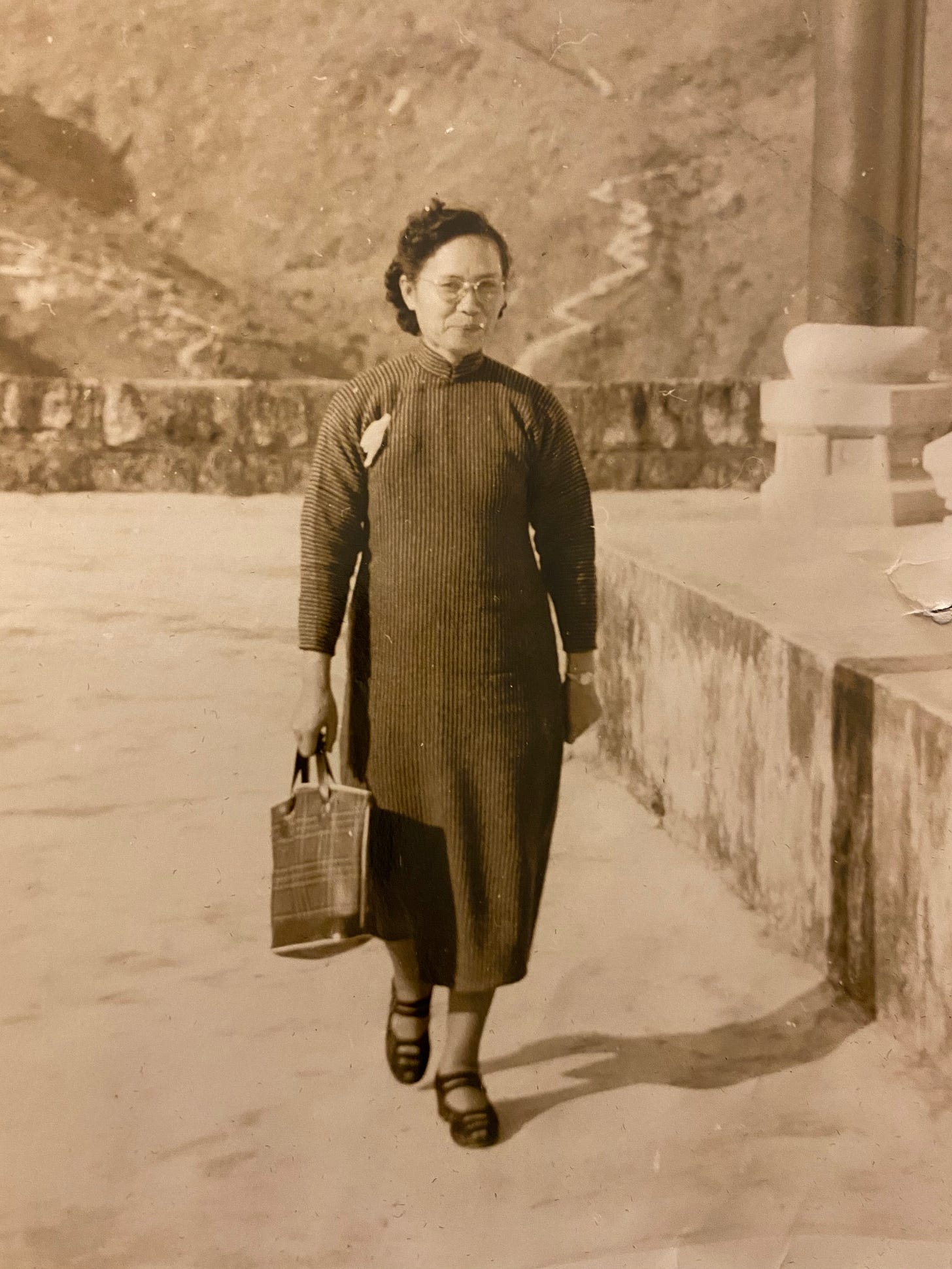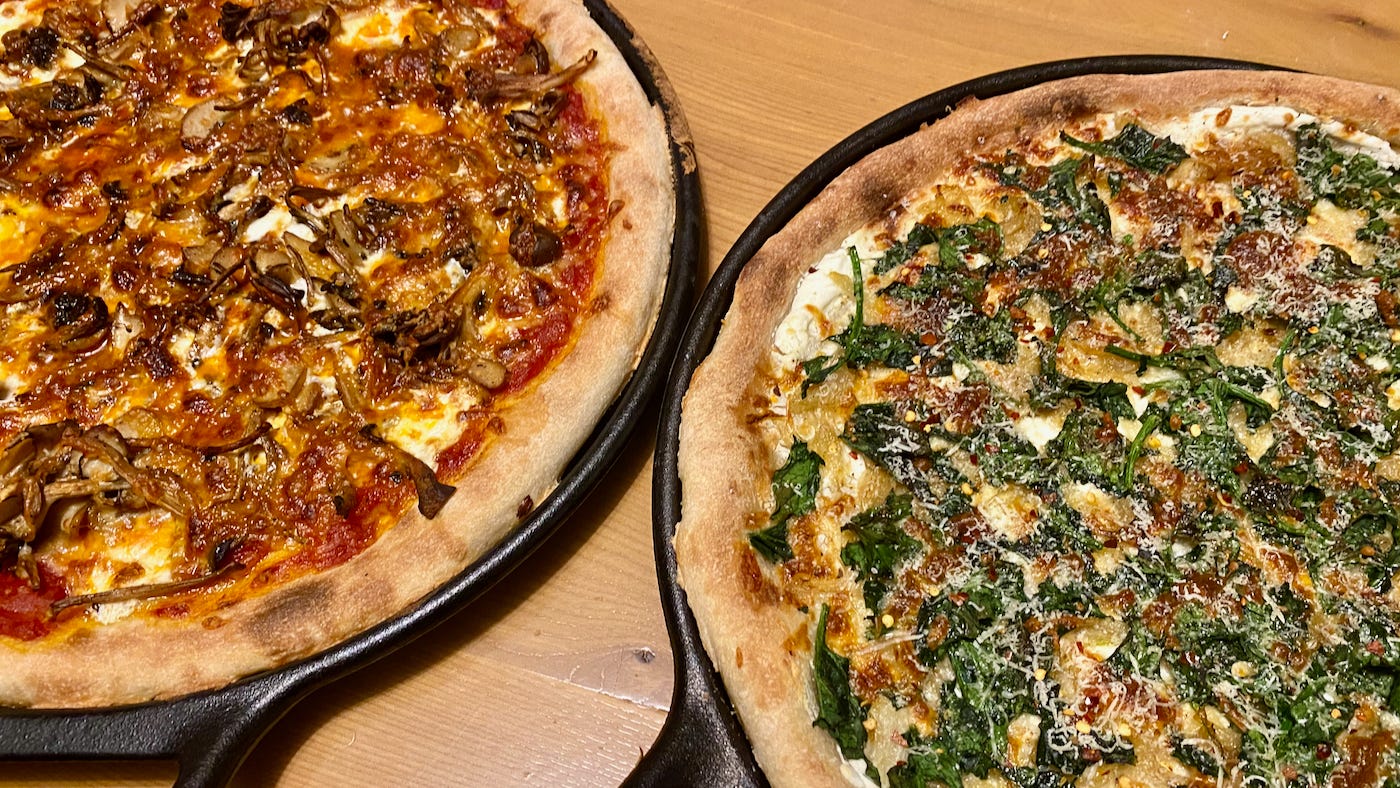On Remembering
Some fragmented thoughts on the pointlessness of calendars, Lenten disciplines, pizza, attention to words and phrases, and a song for the wilderness
Lent III
Grand Rapids, Michigan
Greetings, dear reader.
I was standing in the kitchen this morning, looking at the things on our fridge: some pictures, a couple of magnets, a calendar still open to October 2020.
“It’s March,” I said to Tristan. “We haven’t gotten a new calendar.”
“If and when you have something to put onto a calendar, let me know,” he replied with a laugh.
Fair point. We socialize only with each other and Fozzie. Also, what has time become? We wake up, and it takes us more than a moment to calculate what day it is, because they blur together. And here some of us are, a couple of weeks into Lent, except that it seems we’ve been Lenting a lot longer than a fortnight, as if Lent 2020 just kept going until it ran into Lent 2021.
I say “some of us” because I know not all of you are Lent observers. I wasn’t one until relatively recently. As Baptists, my family didn’t do Lent when I was growing up; my parents still don’t. No pancakes on Shrove Tuesday. No ashes on Ash Wednesday. I still don’t even know how to say “Lent” in Cantonese.
As an outsider to Lent, I saw it at first as an exercise in spiritual self-flagellation. As the eldest son in a Chinese family, I didn’t need a season dedicated to self-flagellation and reminders of one’s utter insufficiency. Why a particular season when you’ve got [checks calendar] an entire life?
When I did start observing Lent, perhaps I came to it with a convert’s zeal, coupled with a perverse desire to prove, mainly to myself, that I could self-abnegate better than anyone: For one of my first Lents, I gave up rice. I’d happily eat rice at every single meal. Rice noodles, fried rice, jasmine rice, basmati rice, sushi rice, dumpling wrappers made from rice, congee—all are delightful. In my dotage, I’ve even come to a quiet and grudging respect for brown rice, which used to irritate me with its nutty insistence on being noticeable instead of blending harmoniously. The only incarnations of rice I reject are the sweet ones, including mochi and rice pudding, which you’ll never find on my table.
It occurs to me now that my abstention from rice didn’t point me toward healthy spirituality or faithful discipleship. I could pretend that I was piously pondering my tremendous self-sacrifice for Jesus’s sake. But I essentially gave up a tiny morsel while still standing before a grand buffet. And my best guesstimate is that, for at least half of the Lents that I’ve observed, I’ve dutifully given something up without really giving anything up. If anything, they’ve been marked by self-absorption—my craving, my comfort, my consumption.
What has changed Lent for me is a rethinking—or, perhaps more precisely, a re-embodiment: reframing the season as a time for remembering.
We remember how Jesus, while in the wilderness for those forty days before he plunged into ministry, was tempted by the devil with “all the kingdoms of the world and their splendor” and how he said to Satan—and maybe also to himself—that we are called to worship, seek, and serve God alone.
We remember that, though the sorrow of death will still come, resurrection awaits too—not because of anything we have done on our own but because of something that was done for us, out of inexplicable love.
We remember that we’re part of a body greater than our own. Sometimes I contemplate my own frail assemblage of skin, bone, and spirit—the pains that plague me, the wounds that remain stubbornly unhealed. I need to be summoned back to my ancestors, whose lives fed into mine. I need to be reminded of the flawed yet faithful examples of the countless generations of spiritual forebears who walked and staggered and fasted and stumbled along this path before us.

We remember that, even as we find ourselves in the midst of a world that preys on our loneliness, we are not and will never be alone. None of us are out here spinning on our own. We’re constituents of a greater galaxy.
We remember that we are called to look not just beyond ourselves but also beyond this world, such that we can see it in its true context—and in the light of its true hope.
Some years ago, Rowan Williams, then the Archbishop of Canterbury, preached a Lenten sermon inspired by the life of the German pastor and theologian Dietrich Bonhoeffer. Lent, Williams mused, invites us into holy contemplation of truth and faithful reimagination of freedom, two concepts that we often understand at a sadly superficial level. “Looking quietly at all the clutter that prevents us from seeing ourselves honestly, looking quietly at the ways in which the world we live in muffles the truth and so frustrates the search for justice and love—this isn’t a luxury,” he said. “This is how the truth makes us free. Not free to do what we fancy at any given moment, but free to be real, to be truthful, to be ‘in the truth,’ as the New Testament puts it. After all, what other sort of freedom is finally worth having?”
During Lent, we remember that the true freedom we seek isn’t something that we can give ourselves. “The end of the story is a fulfillment,” Williams said, “a homecoming for which we can never find adequate words. It’s the freedom to be what we most deeply are.” It’s the freedom, in other words, that can only come from finding our home in the God who loves us, the God who is beyond time and space, the God to whom we belong.
What I’m Cooking: We’re about a year into this tragic pandemic, and it occurred to me yesterday that I have failed at sourdough, haven’t read many books, didn’t produce a great work of literature, still don’t understand what it means to “take each day as it comes” or [insert any cliche about time and presence here], do not feel closer to God or more in love with life, and don’t think I’ve made “the best of it,” whatever. That means. But when Coronatide finally ends, I will be able to say that I acquired one skill: I can now make a decent pizza dough.
Last night’s was made with what was left of the Sonora whole-wheat flour that I got from the Tehachapi Heritage Grain Project out in California. This rich, flavorful flour is made from a grain that carries a story of colonization as well as resilience; it was brought to this side of the Atlantic by a Spanish priest, and then it traveled with the spread of the missions up the coast of what’s now California.
One was topped with red sauce, which we canned at summer’s end; mozzarella; and five kinds of mushrooms from the farmers’ market. The other was a white pie: spinach and caramelized onion atop a goat-cheese cream, with some mozzarella and Parmesan for good measure. I love caramelized onions because you can’t really rush them. Slice the onions thinly and then toss them into a pan with adequate fat. They turn sweet with heat—gentle enough so that they turn golden without burning—and time.
I’ve shared the recipe I use for pizza dough before, but here it is again. It comes from Joe Beddia, a master pizzaiolo in Philadelphia. His book, Pizza Camp, is outstanding. And his dough seems apt for Lent, in that it forces me to slow down and adjust to a different rhythm. It rises slowly, overnight, in the refrigerator. It finds its life and its fulfillment in rest.
What I’m Reading: Marilyn McEntyre, a writer whose wordcraft never fails to inspire wonder, recently published a book for Lent called Where the Eye Alights: Phrases for the Forty Days of Lent. I so appreciate McEntyre’s careful attention to words, which she compels the reader to experience as if for the first time. In her reflection on how we have taken the phrase “into the wilderness,” she reminds us that the wilderness is not a place of ease. Those of us inspired by Jesus’s time away might have adopted spiritual disciplines for this season, but as she notes, “None of these practices produces magical results.” Jesus cautions his disciples “about doing pious practices for the wrong reasons—to be seen, to feel good about righteousness, or out of legalism that always diverges from the way of love. When we do them rightly, it is to invite the Spirit to lead us in those ‘paths of righteousness’ the psalmist speaks about, toward the still waters and green pastures we long for.” May your own Lenten reading usher you toward those still waters and green pastures.
What I’m Listening to: I find myself returning many mornings to the late Icelandic composer Jóhann Jóhannsson’s “Flight from the City.” It comes from his album Orphée, which he wrote when he was reckoning with change in his own life. The album muses “about the death of old relationships and the birth of new ones,” Jóhannsson said. It was inspired in part by the ancient myth of Orpheus, who was blessed with the ability to enchant with music. After his wife, Eurydice, dies, he descends to the underworld, lyre in hand, in an attempt to summon her back, but Hades, who governs the dead, warns that he must not turn around and look for her. But Orpheus fails to heed the warning. Just as he is about to re-enter the realm of the living, with his great love a few steps behind, he loses both his patience and Eurydice. The myth, as Jóhannsson read it, “is fundamentally about change, mutability, death, rebirth, the elusive nature of beauty, and its sometimes thorny relation to the artist.” Of course you don’t have to care about any of that; it’s just a really gorgeous piece of music, one that slows me down (have you noticed a theme?) in the best possible way.
I’d love to hear from you, if you’re willing to share, how you’re marking this Lenten season and how it’s going for you. What’s bedeviling you? It would be an honor to send up a prayer on your behalf. Also, where might you be finding meaning, catching sight of life-giving beauty, or even glimpsing hope?
As ever, I’m so glad we can stumble through all this together, and I’ll try to write again soon.
With gratitude,
Jeff




Jeff I really enjoy your reflections. While I find myself not as stretched out and beaten down by the pandemic as it sometimes sounds like you are (for instance I don't feel like Lent 2020 never ended...), you always have words and thoughts that help me think about what it means for me to follow Jesus and how to reflect the grace that I receive everyday outward...obviously hard to do with so much time spent at home. But I am also reminded of how important it is to see the grace that God is working in my life and that I have to look for it; otherwise I could very well miss it, which I'm sure I do more often than not. Anyway, I am also blessed by your sharing of food and music and so thanks too for opening up to us those parts of your life. Breaking bread and listening to music...what more could anyone ask for?!
I appreciate your thoughtful and self-aware reflections. I do feel like Lent 2020 has stretched into Lent 2021. It has been a hard year of grieving parts of my marriage, parenting and homeschooling my nuerodiverse kids while caring for my own neurodivergence, and all the COVID, racial, social, and political things.